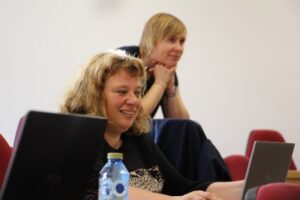The B2-InF consortium has finally had an exciting in person-meeting in the lovely city of Pamplona, hosted by project coordinator Francisco Güell Pelayo, from the Institute for Culture and Society. Here, much was discussed about the project’s Data Analysis phase, that has recently been concluded. The analysis has been done based on State-of-the-Art knowledge, interviews with a sample group of young people aged 18-30 selected among 8 sample countries and the websites/informative material of a great number of fertility clinics across these countries.
The data has been studied, analyzed and elaborated according to legal, gender and socio-cultural perspectives leading us to the next, crucial step: Building guidelines.

During this meeting, all consortium members had the chance to discuss together how to bring all the information collected into effective guidelines, that can provide policy makers, clinics and patients with clear action points meant to significantly improve the Infertility care sector.
Given the complex nature of the topic at hand, it was agreed that the guidelines should focus on providing consistent, updated and complete information to society, considering closing this information gap the first and foremost aim of the project. In fact, despite the different sensitivities and ethical discussions that come into play when it comes to Medically Assisted Reproduction Technology, it is clear that information becomes crucial for any individual taking a decision in this journey. But not only for patients, but also the youngsters that are not yet but could be finding themselves there in their lifetime.

Half-way through the project, results are clear and evident and the energy of the consortium is high, ready to divulge and disseminate our guidelines throughout Europe, hoping to trigger the first step in the long path of improving information about Medically Assisted Reproduction.




